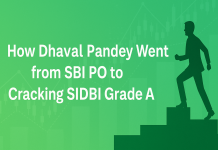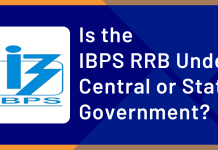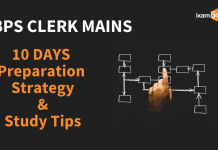The SBI PO exam is one of the most prestigious exams in the Indian public sector bank domain. With thousands of aspirants aiming to secure a position in the State Bank of India as a Probationary Officer (PO), having a well-structured and efficient preparation strategy is essential. Here, we’ll cover effective preparation tips, a study plan, and resources to help you ace the exam. Whether you’re a first-time candidate or a repeat aspirant, this guide will set you on the path to success in the highly competitive SBI PO selection process.
Preparing for the SBI PO exam requires a blend of dedication, focus, and smart planning to stay ahead in the competitive landscape of India’s public sector bank exams. A successful preparation strategy starts with understanding the exam structure, syllabus, and weight-age of each section. Effective preparation tips, such as dividing your study hours according to each section’s demands, setting short-term goals, and utilizing mock tests, will help you refine your strengths and work on weaker areas. With the right approach and consistent effort, your journey toward becoming a Probationary Officer in SBI can be both achievable and rewarding.

Understanding the SBI PO Exam Structure
Understanding the SBI PO exam structure is important for effective preparation, especially for those aspiring to join a prestigious public sector bank. The exam consists of three phases: preliminary, main, and an interview round. Each phase tests different skill areas, so aligning your preparation tips to the structure will help maximize efficiency. Knowing the weight-age and format of each section ensures a more targeted and successful approach.
| Phase | Test | Sections | Total Questions | Total Marks | Time Duration |
| Preliminary | Objective | English, Quantitative Aptitude, Reasoning | 100 | 100 | 60 minutes |
| Main | Objective + Descriptive | Reasoning, Data Analysis, General Awareness, English | 155 + 2 | 200 + 50 | 3 hours 30 minutes |
| Interview | Group Exercise + Interview | – | – | 50 | Varies |
Understand the SBI PO Syllabus Thoroughly
A thorough understanding of the SBI PO syllabus is fundamental to focused preparation. Knowing the topics covered allows you to allocate time effectively and prioritize areas that need more attention. For anyone aiming to join a public sector bank, covering every syllabus point ensures a comprehensive approach. To ensure no area is missed, follow strategic preparation tips and build a strong foundation for all stages of the SBI exam.
Here’s a breakdown of essential topics in each section:
| Section | Important Topics |
| Quantitative Aptitude | Data Interpretation, Simplification, Number Series, Quadratic Equations, Data Sufficiency, Arithmetic Problems |
| Reasoning | Puzzles, Seating Arrangement, Syllogism, Coding-Decoding, Blood Relations, Inequalities, Logical Reasoning |
| English Language | Reading Comprehension, Cloze Test, Error Detection, Sentence Improvement, Para Jumbles, Fill in the Blanks |
| General/Economic Awareness | Banking Awareness, Current Affairs, Static GK, Important Economic Terminologies, Financial Awareness |
Plan a Daily Study Routine
A well-structured daily study routine is essential for effective SBI PO preparation. Dedicate consistent hours each day to cover all sections of the syllabus, balancing weaker and stronger areas. Following a set schedule ensures steady progress, helping you meet the demands of a public sector bank exam. Here’s a sample plan:
| Time | Activity |
| 6:00 AM – 7:00 AM | Reading newspapers and Current Affairs for General Awareness |
| 10:00 AM – 12:00 PM | Quantitative Aptitude Practice (focus on Data Interpretation) |
| 1:00 PM – 2:00 PM | English Language (Reading Comprehension, Cloze Test, Grammar) |
| 4:00 PM – 6:00 PM | Reasoning Practice (focus on Puzzles and Logical Reasoning) |
| 8:00 PM – 9:00 PM | Revision and Mock Test analysis |
Choose the Right Study Materials
Choosing the right study materials is essential for effective SBI PO preparation. Invest in books and online resources specifically designed for public sector bank exams. Quality resources provide targeted preparation tips and practice questions, boosting your understanding and readiness. Here’s a curated list of top resources for SBI PO success:
| Subject | Recommended Books/Resources |
| Quantitative Aptitude | “Quantitative Aptitude for Competitive Examinations” by R.S. Aggarwal |
| Reasoning Ability | “A Modern Approach to Verbal & Non-Verbal Reasoning” by R.S. Aggarwal |
| English Language | “Objective General English” by S.P. Bakshi |
| General Awareness | Newspapers like The Hindu, Indian Express, and monthly magazines |
Online platforms like ixamBee also offer free mock tests like SBI PO Prelims and SBI PO Mains mock test and courses that can help strengthen your preparation for public sector bank exams like SBI PO.
Take Mock Tests Regularly
Mock tests are vital for any competitive exam preparation, especially for the SBI PO. They help in understanding exam patterns, managing time efficiently, and identifying weak areas. Aim to take at least two full-length mock tests per week, gradually increasing the frequency as you approach the exam date.
| Mock Test Schedule | Frequency | Objective |
| Initial Phase | 1 mock test per week | Familiarity with exam pattern |
| Mid Preparation Phase | 2 mock tests per week | Improved speed and accuracy |
| Last 1-2 Weeks Before Exam | Daily mock tests | Time management and final revision |
Analyze each mock test thoroughly. Look at your mistakes, note your weaker sections, and revise accordingly.
Focus on Time Management and Accuracy
Effective time management is important for success in both the prelims and mains of the SBI PO exam. Balancing speed with accuracy can greatly impact your score. Use specific preparation tips, such as practicing timed mock tests and setting section-wise goals to master the timing required for public sector bank exams:
- Set a Time Limit for Each Question: Aim to answer questions quickly without compromising accuracy.
- Identify Easier Questions First: In competitive exams like SBI PO, maximizing your score is important. Start with questions you find easier and save complex ones for later.
- Practice Shortcuts: Focus on shortcut techniques for calculations to save time, especially in quantitative aptitude.
Strengthen Your Weak Areas
To excel in the SBI PO exam, focus on strengthening weaker areas identified through practice tests. Targeted preparation helps turn weaknesses into strengths, a critical step for public sector bank exams. Dedicate extra time to challenging sections, using specific preparation tips and resources to build confidence and improve overall performance:
- If Quantitative Aptitude is challenging, dedicate 2-3 hours daily to solving questions and understanding shortcut techniques.
- For English, read editorial articles daily to improve vocabulary and comprehension skills.
Stay Updated with Current Affairs
General Awareness, especially current affairs related to the economy and the banking sector, plays a significant role in the SBI PO mains exam. Develop the habit of reading a newspaper and following daily current affairs.
Pro tip: Create a separate notebook to jot down important facts, events, and economic terminologies for revision purposes.
Join an Online Coaching or Study Group
Enrolling in an online coaching platform like ixamBee can provide access to structured courses, mock tests, and expert faculty guidance. Additionally, joining a study group can facilitate discussions, provide motivation, and help clarify doubts.
| Benefits of Joining Online Coaching | Details |
| Structured Curriculum | Covers all topics in a systematic manner |
| Expert Guidance | Learn tips and tricks from experienced faculty |
| Peer Learning | Compete with other aspirants, which fosters better learning |
| Flexibility | Access courses and mock tests anytime, anywhere |
Develop a Revision Plan
As the exam date approaches, developing a revision plan becomes essential for SBI PO preparation. Allocate time to review key concepts, formulas, and practice questions. A structured revision routine ensures comprehensive coverage and retention, equipping you for success in the public sector bank exam. Here’s a structured revision plan to follow:
| Days Before Exam | Revision Focus |
| 30-15 Days | Focus on Quantitative Aptitude and Reasoning |
| 15-10 Days | Focus on English Language and General Awareness |
| 10-5 Days | Revise formulas, shortcuts, and vocabulary |
| Last 5 Days | Mock tests, previous year’s question papers, and general revision |
Keep a Positive Attitude and Take Care of Your Health
Mental and physical well-being play an equally important role in your preparation journey. Practice stress-management techniques like meditation or light exercises. Staying positive and confident can make a world of difference in your preparation.
Sample Weekly Study Plan for SBI PO Preparation
| Week | Quantitative Aptitude | Reasoning Ability | English Language | General Awareness |
| Week 1 | Simplification, Number Series | Coding-Decoding, Syllogism | Grammar Basics | Current Affairs, Banking Awareness |
| Week 2 | Data Interpretation, Quadratic Equations | Puzzles, Seating Arrangements | Reading Comprehension, Cloze Test | Static GK, Current Affairs |
| Week 3 | Data Sufficiency, Arithmetic | Logical Reasoning, Input-Output | Sentence Correction, Error Detection | Economic Terms, Current Affairs |
| Week 4 | Revision + Mock Tests | Revision + Mock Tests | Revision + Mock Tests | Revision + Mock Tests |
Set Realistic Goals and Milestones
Setting realistic goals and milestones is vital for your SBI PO preparation journey. By breaking down your study plan into smaller, manageable tasks, you can prevent overwhelming and maintain motivation. This approach aligns with effective preparation tips for aspiring candidates aiming for success in a public sector bank exam.
- Weekly Targets: Set weekly goals based on individual topics or sections you need to improve. For example, dedicate a week solely to mastering Quantitative Aptitude basics before moving on to advanced topics.
- Monthly Checkpoints: Monthly assessments, such as a full-length mock test, give you an overview of your readiness and highlight specific areas that may need further improvement.
| Milestone | Objective | Examples |
| Weekly Target | Focus on one section at a time | Complete all Reading Comprehension exercises |
| Monthly Checkpoint | Take full-length tests to track overall progress | Analyze scores in mock tests and adjust schedule |
Leverage Time-Saving Techniques for Exam Success
Acing the SBI PO exam requires not just knowledge, but also efficiency in answering questions. Here are some essential timesaving techniques to incorporate into your preparation.
- Use Elimination Techniques: In sections like Reasoning aptitude and English Language, eliminating obviously wrong options quickly can narrow down choices and save time.
- Focus on Simplification for Quant: Simplifying calculations using mental math, Vedic math, and shortcuts is important. For instance, practice square and cube calculations to reduce dependence on calculators.
- Master High-Scoring Topics: Identify high-weight-age topics like Data Interpretation in Quantitative Aptitude, and Seating Arrangement in Reasoning. Excelling in these areas boosts your score significantly.
Optimize Your Revision with Smart Techniques
Optimizing your revision with smart techniques is important for SBI PO preparation due to the vast syllabus. Employ strategies like active recall, spaced repetition, and mind mapping to enhance memory retention. These effective preparation tips will ensure you are well-prepared for the challenges of the public sector bank exam.
- Use Mind Maps and Flashcards: Creating mind maps for reasoning techniques or flashcards for vocabulary words can help you remember critical concepts easily.
- Incorporate the Pomodoro Technique: This technique involves studying for 25 minutes, then taking a 5-minute break. It helps to keep focus high and reduce mental fatigue during long study sessions.
- Color-Coding and Highlighting: For subjects like General Awareness and English Grammar, use color-coding to organize information. Highlight important rules or facts you might need to revisit often.
| Revision Technique | Benefits |
| Mind Maps | Visual representation improves concept clarity |
| Flashcards | Quick recall, especially for vocabulary |
| Pomodoro Technique | Boosts focus and productivity |
Mock Test Strategy: Analyze, Adapt, and Improve
One of the most effective preparation tips is regular mock testing, which should be a core component of your SBI PO strategy. However, simply taking tests isn’t enough; you need to analyze and learn from each attempt.
- Track Your Mistakes and Patterns: After each mock test, note where mistakes occur most often. Is it due to a lack of time, a misunderstanding of the question, or gaps in your knowledge?
- Adjust Your Strategy for Stronger Sections: If you consistently excel in English but struggle in Quantitative Aptitude, you might adjust your study plan to dedicate more time to quant.
- Simulate Exam Conditions: Take mock tests under timed, quiet conditions to familiarize yourself with the actual exam environment. This helps reduce anxiety and improves time management.
| Mock Test Analysis Checklist | Purpose |
| Identify Patterns in Mistakes | Target specific weaknesses |
| Track Time Management for Each Section | Helps optimize speed |
| Test under Exam-Like Conditions | Builds confidence and familiarity |
Gain Insights into the Banking Industry and SBI’s Role as a Public Sector Bank
A important yet often-overlooked aspect of preparing for a public sector bank exam like SBI PO is understanding the broader context in which you’ll be working. Staying informed about the latest developments in the banking industry can be particularly helpful for the General Awareness section of the SBI PO Mains exam and during the interview stage.
- Stay Updated on Financial News: Read up on SBI’s recent initiatives, financial performance, and role as a public sector bank. Focus on topics like banking policies, financial inclusion, digital banking, and other trends that highlight SBI’s mission and values.
- Follow Government and RBI Policies: Understand how policies from the Reserve Bank of India (RBI) and the Ministry of Finance impact public sector banks. This knowledge can also enhance your answers in the interview stage.
- Engage with Industry Insights: Following industry insights from sources like the Economic Times and Business Standard, keeps you informed about challenges, trends, and growth in the banking sector.
| Industry Insights | Preparation Benefits |
| Financial News and Public Sector Policies | Enhances performance in General Awareness section |
| Knowledge of Banking Policies | Strengthens your interview responses |
| Updates on Digital Banking | Helps in understanding technological shifts impacting banking |
Build Your Mental and Emotional Resilience
Building mental and emotional resilience is essential for successful SBI PO preparation, as it is a marathon, not a sprint. Incorporating stress management techniques, such as mindfulness and regular breaks, can significantly enhance your focus and performance. These valuable preparation tips are important for aspiring candidates in the public sector bank exam.
- Set Small, Positive Rewards: When you reach a study goal or a milestone, reward yourself with something enjoyable, like a favorite snack or a movie. This practice reinforces positive behaviors and keeps you motivated.
- Practice Mindfulness Techniques: Meditation, deep breathing, and even yoga can help you manage stress and keep your mind clear during your preparation.
- Focus on the Bigger Picture: Remind yourself of the benefits of working for SBI as a public sector bank—stability, growth, and a fulfilling career. Keeping this in mind can keep you motivated and give you a reason to push through difficult times.
Embrace a Growth Mindset for Continued Improvement
A growth mindset allows you to view challenges as opportunities to learn rather than obstacles. When faced with difficult topics or test scores, see them as steppingstones to your improvement.
- Learn from Your Mistakes: Instead of feeling discouraged by errors, focus on learning from them. What can you do differently next time? This mindset promotes continuous improvement.
- Track Your Progress to Stay Motivated: Maintain a journal or planner to track your improvements over time. Even small wins can motivate you to keep pushing toward your goal.
Conclusion
Preparing for SBI PO requires focus, discipline, and a well-structured plan. By understanding the syllabus, practicing regularly, and taking mock tests, you’ll be well on your way to cracking the exam. Remember, it’s not just about hard work but also smart work.
The right preparation strategies, coupled with dedication, will help you succeed in securing a position in a public sector bank like SBI.
Prepare for the SBI PO 2025 exam with ixamBee’s top-notch resources! Ace your preparation with our SBI PO Prelims mock tests, designed to mirror the real exam. Practice with SBI PO Prelims PYP to get an edge over the competition. Enroll in our expert-led SBI SO Interview online course or the comprehensive Target Banking Online Course to boost your success. Start now with ixamBee and turn your dream job into reality!
ixamBee specializes in providing expert guidance and resources for banking exams 2025, ensuring that you are well-prepared for the Upcoming Bank Exams like RBI Grade B, NABARD Grade B, IBPS SO, and more. Our courses align with the bank exam calendar 2024, covering all the essential topics. With a focus on the upcoming bank jobs, our Previous Year Papers, BeePedia, SSC CGL, SSC CHSL, SSC MTS and other Mock Tests are designed to help you excel in upcoming banking exams.
How is Life After Joining as an SBI PO?
SEBI Grade A 2025: Exam Pattern Details
How to Prepare for SEBI Grade A Exam in Less Time















